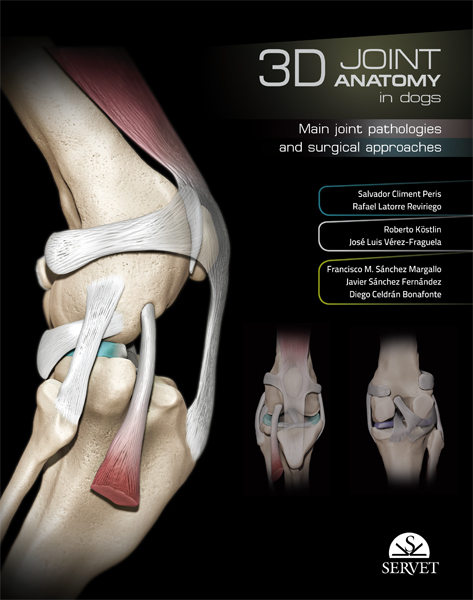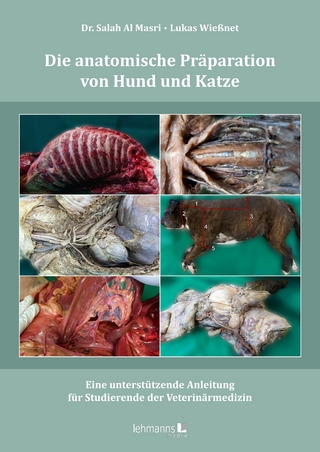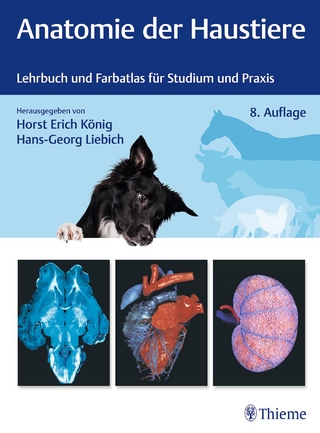It also describes the key orthopaedic conditions affecting each joint and the most commonly used surgical approaches. It contains a large number of images and illustrations, and a selection of views presented in digital video format.
Salvador Climent Peris is Professor Emeritus at the University of Zaragoza since 2012 Graduate in Veterinary Medicine from the University of Zaragoza, 1969. Professor of Veterinary Anatomy and Embriology since 1982. He has completed terms at the Anatomy Departments of the Faculties of Medicine at the University of Zaragoza, Madrid Complutense University and the Free University of Brussels, the Faculty of Veterinary Medicine in Toulouse, and the Animal Biology Department at the University of Clermont-Ferrand (France). He has been actively involved in the set-up and development of CCMIJU in Cáceres since 1986, taking part in the design, preparation and selection of appropriate animal models for the specialisation courses in minimally invasive surgical techniques taught at the school.
Rafael Latorre Reviriego is Professor of Veterinary Anatomy, obtaining his Doctorate in Veterinary Medicine in 1990 from the University of Murcia. He has completed terms at the University of Milan (Italy), Davis (California, USA) Cambridge (UK), Tennessee (USA) and London (UK). A large part of his activity has focused on the clinical anatomy of the locomotion system, in particular significant contributions in the form of anatomy atlases and books, as well as scientific papers published in prestigious journals, mainly relating to image diagnosis of joint conditions. His involvement in the development and teaching of anatomical plastination techniques as a tool for working in clinical anatomy has led him to hold the position of Vice President of the International Society for Plastination.
Roberto Köstlin is Doctor in Veterinary Medicine from the National University of the Northeast, Corrientes (Argentina). Graduate in Veterinary Medicine and training as a tutor at the Ludwig-Maximilians University in Munich (Germany). Diploma from the European College of Veterinary Surgeons (ECVS). Assistant Professor of Surgery at the School of Veterinary Medicine in Hannover (Germany). Assistant Professor of Surgery and Ophthalmology at the Ludwig-Maximilians University in Munich. He has published a number of books and over 100 scientific papers. He has also given countless international conferences around the world.
José Luis Vérez-Fraguela is Graduate and Doctor of Veterinary Medicine and Animal Health from the Faculty of Veterinary Medicine at the University of Extremadura (UEX). Teaching and research assistant at the Department of Surgery at UEX. Research assistant at the Experimental Surgery Unit at the University Hospital of A Coruña (CHUAC). Assistant at the Department of Animal Medicine and Health at UEX. Scientific advisor in veterinary orthopaedics for CCMI Jesús Usón. He has completed terms at Universities in Europe, the USA and Japan. He received the National Research Prize in 1998. He was also granted a European Patent in 2011. He has completed a number of different subsidised research projects, and is a scientific reviewer and member of the scientific and organising committees for a range of different courses, conferences and talks. He has written over 70 publications including books, essays and original papers, and has given countless conferences, talks and courses.
Francisco Miguel Sánchez Margallo is Scientific Director for CCMIJU in Cáceres. Doctor in Veterinary Medicine from the University of Extremadura, speaker and director for over 450 national and international training activities, for the practical training of surgeons and other healthcare professionals. He is the author of over 120 publications in scientific journals and over 70 further publications on minimally invasive surgery. With over 10 published books, he has also contributed to over 40 further publications in several languages. He has been involved in over 430 national and international scientific conferences in the field of minimally invasive procedures and surgical technology. He has supervised 12 Doctorates and tutored 4 international Doctorate students, and has directed or taken part in over 70 RDI projects, including European and business projects, as the author of over 10 patents. He is currently a member of several national and international associations relating to health, surgery and health technology, and is a reviewer and member of the editorial committee for different international journals.
Javier Sánchez Fernández is Graduate in Veterinary Medicine from the University of Extremadura, he is currently writing a thesis in the field of the assessment and optimisation of health training programmes. He has worked as a quality consultant and accredited trainer for many years. He is an assessor for the Commission for Continuous Professional Development for Healthcare in Extremadura and also works with the School of Health Sciences in Extremadura. As a Training Coordinator and Quality Manager for CCMIJU in Cáceres, he has taken part in over 700 training activities and the assessment and supervision of over 7000 healthcare professionals in 17 countries. He is a founder member and Secretary of the Spanish Association for Minimally Invasive Veterinary Medicine and sits on the scientific committees for a number of symposiums and conferences, both national and international.
Diego Celdrán Bonafonte is Graduate in Veterinary Medicine from the University of Extremadura. Intern at the Departments of Surgery and Pathological Anatomy at the Faculty of Veterinary Medicine in Cáceres, he has spent most of his professional career in the area of exotic animals. He has completed terms in different national and international institutions as a veterinary surgeon. He was selected by CCMIJU in Cáceres for a pre-Doctorate scholarship to commence his career as a researcher. He currently manages the CCMIJU Animal Modelling Department, while collaborating in the organisation of different training activities in the area of veterinary orthopaedics.
1. Stifle joint
Three-dimensional views
Orthopaedic conditions of the stifle joint
Rupture of cranial cruciate ligaments
Patellar luxation
Osteochondrosis dissecans
Arthritis/osteoarthritis
Diagnostic imaging techniques
Surgical approaches
2. Hip joint
Three-dimensional views
Orthopaedic conditions of the hip
Hipdysplasia
Avascular necrosis of the femoral head
Diagnostic imaging techniques
Surgical approaches
3. Elbow joint
Three-dimensionalviews
Orthopaedic conditions of the elbow
Fragmented coronoid process (FCP)
Osteochondrosis dissecans (OCD)
Ununited anconeal process (UAP)
Joint incongruity (JI)
Diagnostic imaging techniques
Surgical approaches
4. Shoulder joint
Three-dimensional views
Orthopaedic conditions of the shoulder
Luxations
Osteochondrosis dissecans of the humeral head
Calcification of the supraspinatus tendon
Tenosynovitis of biceps brachii muscle tendon
Diagnostic imaging techniques
Surgical approaches
5. Carpal and tarsal joints
Three-dimensional views
Orthopaedic conditions of the carpal and tarsal joints
Carpal joint
Carpal luxation and subluxation: hyperextension
Tarsal joint
Tarsal luxation and subluxation
Medial tarsal abrasion
Osteochondritis dissecans of the talus
Arthrodesis and pan-arthrodesis
Diagnostic imaging techniques
Surgical approaches
Bibliography
This publication 3D Joint anatomy in dogs - Main joint pathologies and surgical approaches has three key noteworthy aspects.
Firstly, it is of doubtless clinical value, as it focuses on the six main joints of the dog’s body.
Secondly, it is developed in stages, from the clear and precise anatomic context of each and every joint, with a series of real images obtained by CT and MRI scans, x-rays and even fluoroscopes, and a collection of specially designed three dimensional drawings, together with real plastinated sections to clarify any further doubts that the reader may have. Having provided a clear presentation of the anatomy, the book is complemented with a description of the most common pathologies in canine joints.
All this is required in order to perform the different orthopaedic procedures required to treat these pathologies, brought together in a specific manner in this publication.
The project, which has brought together the work of anatomists, imaging specialists and clinicians from a number of countries, was intended from the outset to be of direct application in orthopaedics and use in daily clinical practice with dogs. The correlation of the CT and MRI images with real plastinated sections, which facilitate an understanding of the anatomical structures and the consequences of different pathologies, has therefore resulted in an entirely appropriate increase on the part of the authors of the number of images used in relation to the text.
Overall, and considering the importance of diagnostic imaging techniques, this work is not only of interest for clinical professionals but is also relevant to all the recent developments taking place in the field of cell therapy, regarding the regeneration of cartilage and control of inflammation, as the images provided through CT and MIR scans provide us with a clear and accurate picture of the evolution and monitoring of these aspects.
Given the above, I advise clinical staff to keep a copy of this project among their reference books, for clinical application and consultation purposes.
Prof. Jesús Usón
Professor of Surgical and Pathology and Surgery
Honorary Chairman of the CCMIJU Foundation
| Erscheint lt. Verlag | 1.1.2014 |
|---|---|
| Zusatzinfo | 270 meist farb. Abb. |
| Sprache | englisch |
| Maße | 22 x 280 mm |
| Gewicht | 960 g |
| Einbandart | gebunden |
| Themenwelt | Veterinärmedizin ► Vorklinik ► Anatomie |
| Veterinärmedizin ► Kleintier ► Chirurgie | |
| Schlagworte | Chirurgie (Veterinärmedizin) • Veterinärmedizin / Chirurgie, Orthopädie, Trauma |
| ISBN-10 | 84-942775-5-3 / 8494277553 |
| ISBN-13 | 978-84-942775-5-9 / 9788494277559 |
| Zustand | Neuware |
| Informationen gemäß Produktsicherheitsverordnung (GPSR) | |
| Haben Sie eine Frage zum Produkt? |
aus dem Bereich




